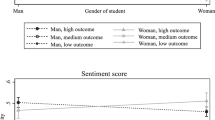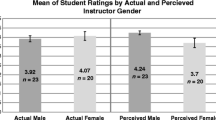Abstract
Does teacher's gender impact students' evaluations? We critically evaluated the research literature and concluded that the form gender bias takes may not be easily detectible by quantitative scales. To explore this possibility, we did a qualitative analysis of the words that 288 college students at two campuses used to describe their best- and worst-ever teachers. Although we found considerable overlap in the ways that students talked about their male and female teachers, we also saw indications that students hold teachers accountable to certain gendered expectations. These expectations place burdens on all teachers, but the burdens on women are more labor-intensive. We also saw signs of much greater hostility toward women than toward men who do not meet students' gendered expectations.
Similar content being viewed by others
References
Aleamoni, L. (1999). Student rating myths versus research facts from 1924 to 1998. Journal of Personnel Evaluation in Education, 13, 153–166.
Bachen, C., McLoughlin, M.,& Garcia, S. (1999). Assessing the role of gender in college students' evaluations of faculty. Communication Education, 48, 193–210.
Baker, P.,& Copp, M. (1997). Gender matters most: The interaction of gendered expectations, feminist course content, and pregnancy in student course evaluations. Teaching Sociology, 25, 29–43.
Bartky, S. (1988). Foucault, femininity, and the modernization of patriarchal power. In L. Quinby& I. Diamond (Eds.), Feminism and Foucault: Paths of resistance (pp. 61–86). Boston, MA: Northeastern Univ. Press.
Basow, S. A. (2000). Best and worst professors: Gender patterns in students choices. Sex Roles, 43, 401–417.
Bem, S. L. (1983). Gender schema theory and its implications for child development: Raising gender-aschematic children in a gender-schematic society. Signs, 8, 598–616.
Bennett, S. K. (1982). Student perceptions of and expectations for male and female instructors: Evidence relating to the question of gender bias in teaching evaluation. Journal of Educational Psychology, 74, 170–179.
Biernat, M. (1995). The shifting standards model: Implications of stereotype accuracy for social judgment. In Y. T. Lee, L. Jussim,& C. McCauley (Eds.), Stereotypes: Perspectives on accuracy and inaccuracy (pp. 87–114). Washington, DC: American Psychological Association.
Biernat, M.,& Kobrynowicz, D. (1997). Gender- and race-based standards of competency: Lower minimum standards but higher ability standards for devalued groups. Journal of Personality and Social Psychology, 72, 544–557.
Biernat, M.,& Manis, M. (1994). Shifting standards and stereotype-based judgments. Journal of Personality and Social Psychology, 66, 5–20.
Biernat, M., Manis, M.,& Nelson, T. E. (1991). Stereotypes and standards of judgment. Journal of Personality and Social Psychology, 60, 485–499.
Bordo, S. (1993). Unbearable weight: Feminism, western culture, and the body. Berkeley, CA: University of California Press.
Bray, J.,& Howard, J. (1980). Interaction of teacher and student sex and sex role orientations and student evaluations of college instruction. Contemporary Educational Psychology, 5, 241–248.
Burns-Glover, A.,& Veith, D. (1995). Revisiting gender and teaching evaluations: Sex still makes a difference. Journal of Social Behavior and Personality, 10(6), 69–80.
Carli, L. L. (1990). Gender, language, and influence. Journal of Personality and Social Psychology, 59, 941–951.
Cashin, W. E. (1999). Student ratings of teaching: Uses and misuses. In P. Seldin (Ed.), Changing practices in evaluating teaching: A practical guide to improved faculty performance and promotion/tenure decisions (pp. 25–40). Boston, MA: Anker.
Chafetz, J. (Ed.). (1999). Handbook of the sociology of gender. New York: Plenum.
Charmaz, K. (1983/2004). Grounded theory. In S. N. Hesse-Biber& P. Levy (Eds.), Approaches to qualitative research: A reader on theory and practice (pp. 496–521). Oxford: Oxford University Press.
Connell, R. W. (1995). Masculinities. Berkeley, CA: University of California Press.
Davis, N. (1992). Teaching about inequality: Student resistance, paralysis, and rage. Teaching Sociology, 20, 232–238.
Eitzen, S.,& Zinn, M. B. (1989). The de-athleticization of women: The naming and gender-marking of collegiate sport teams. Sociology of Sport Journal, 6, 362–370.
England, P., Herbert, M. S., Kilbourne, B. S., Reid, L. L.,& Megdal, L. M. (1994). The gendered valuation of occupations and skills: Earnings in the 1980 census occupations. Social Forces, 73(1), 65–99.
Feldman, K. (1992). College students' views of male and female college teachers: Part I–-Evidence from the social laboratory and experiments. Research in Higher Education, 33, 317–373.
Feldman, K. (1993). College students' views of male and female college teachers: Part II–-Evidence from students' evaluations of their classroom teachers. Research in Higher Education, 34, 151–211.
Fernandez, J.,& Mateo, M. (1997). Student and faculty gender in ratings of university teaching quality. Sex Roles, 37, 997–1003.
Ferree, M. M., Lorber, J.,& Hess, B. B. (Eds.). (1999). Revisioning gender. Thousand Oaks, CA: Sage.
Ferree, M. M.,& McQuillan, J. (1998). Methodological and policy issues in university salary studies. Gender and Society, 12, 7–39.
Fiske, S. T.,& Taylor, S. E. (1991). Social cognition. New York: McGraw-Hill.
Freeman, H. (1994). Student evaluations of college instructors: Effects of type of course taught, instructor gender and gender role, and student gender. Journal of Educational Psychology, 86, 627–630.
Gallup Poll online. (2001, February 21). Americans see women as emotional and affectionate, men as more aggressive. Retrieved from February 27, 2001 http://www.gallup.com/poll/releases/pr010221.asp
Hochschild, A. (1983). The managed heart: Commercialization of human feeling. Berkeley, CA: University of California Press.
Howard, J. W.,& Rothbart, M. (1980). Social categorization and memory for in-group and out-group behavior. Journal of Personality and Social Psychology, 38, 301–310.
Kashima, Y. (2000). Maintaining cultural stereotypes in the serial reproduction of narratives. Personality and Social Psychology Bulletin, 26, 594–600.
Kobrynowicz, D.,& Biernat, M. (1997). Decoding subjective evaluations: How stereotypes provide shifting standards. Journal of Experimental Social Psychology, 33, 579–601.
Kobrynowicz, D.,& Biernat, M. (1998). Considering correctness, contrast, and categorization in stereotyping phenomena. In R. S. Wyer Jr. (Ed.), Stereotype activation and inhibition: Advances in social cognition (pp. 109–126). Mahwah, NJ: Erlbaum.
Kramer, C., Thorne, B.,& Henley, N. (1978). Perspectives on language and communication. Signs, 3, 638–651.
Lakoff, R. (1975). Language and women's place. New York: Harper& Row.
Martin, E. (1984). Power and authority in the classroom: Sexist stereotypes in teaching evaluations. Signs, 9, 482–492.
Martin, P. Y. (1996). Gendering and evaluating dynamics: Men, masculinities, and managements. In D. Collinson& J. Hearn (Eds.), Men as managers, managers as men (pp. 186–209). Thousand Oaks: Sage.
Messner, M. A. (2000). White guy habitus in the classroom: Challenging the reproduction of privilege. Men and Masculinities, 2, 457–469.
Messner, M. A., Duncan, M.,& Jensen, K. (1993). Separating the men from the girls: The gendered language of televised sports. Gender and Society, 7, 121–137.
Miller, J.,& Chamberlin, M. (2000). Women are teachers, men are professors: A study of student perceptions. Teaching Sociology, 28, 283–298.
Neitz, M. J. (1985). Resistances to feminist analysis. Teaching Sociology, 12, 339–353.
Rakow, L. F. (1991). Gender and race in the classroom: Teaching way out of line. Feminist Teacher, 6, 10–13.
Ridgeway, C. L. (1987). Nonverbal behavior, dominance, and the basis of status in task groups. American Sociological Review, 52, 683–694.
Rothbart, M., Evans, M.,& Fulero, S. (1979). Recall for confirming events: Memory processes and the maintenance of social stereotyping. Journal of Experimental Social Psychology, 14, 237–255.
Rubin, R. B. (1981). Ideal traits and terms of address for male and female college professors. Journal of Personality and Social Psychology, 41, 966–974.
Seldin, P. (1999). Current practices-good and bad-nationally. In P. Seldin (Ed.), Changing practices in evaluating teaching: A practical guide to improved faculty performance and promotion/tenure decisions (pp. 1–24). Boston, MA: Anker.
Sinclair, L.,& Kunda, Z. (2000). Motivated stereotyping of women: She's fine if she praised me, but incompetent if she criticized me. Personality and Social Psychology Bulletin, 26, 1329–1342.
Siskind, T.,& Kearns, S. (1997). Gender bias in the evaluation of female faculty at the citadel: A qualitative analysis. Sex Roles, 37, 495–525.
Sprague, J. (2005). Feminist methodologies for critical researchers: Bridging differences. Walnut Creek, CA: Alta Mira/Rowman& Littlefield.
Sprague, J.,& Kobrynowicz, D. (1999, August). Gender and the evaluation of teachers. Paper presented at the meetings of the American Sociological Association, Chicago, IL.
Steinberg, R.,& Haignere, L. (1987). Equitable compensation: Methodological criteria for comparable worth. In C. Bose& G. Spitze (Eds.), Ingredients for women's employment policy (pp. 157–182). Albany, NY: State University of New York Press.
Strauss, A.,& Corbin, J. (1994) Grounded theory methodology: An overview. In N. K. Denzin& Y. S. Lincoln (Eds.), Handbook of qualitative research (pp. 273–285). Thousand Oaks, CA: Sage.
Tatro, C. (1995). Gender effects on student evaluations of faculty. Journal of Research and Development in Education, 28, 169–173.
Trout, P. (2000, July/August). Flunking the test: The dismal record of student evaluations. Academe, 86, 58–61.
West, C.,& Fenstermaker, S. (1993). Doing difference. Gender and Society, 9, 8–37.
West, C.,& Zimmerman, D. (1987). Doing gender. Gender and Society, 1, 125–151.
Wheeless, V.,& Potorti, P. (1989). Student assessment of teacher masculinity and femininity: A test of the sex role congruency hypothesis on student attitudes toward learning. Journal of Educational Psychology, 81, 259–262.
Zadny, J.,& Gerard, H. B. (1974). Attributed intentions and informational selectivity. Journal of Experimental Social Psychology, 10, 34–52.
Author information
Authors and Affiliations
Corresponding author
Additional information
An earlier version of this paper was presented at the annual meetings of the American Sociological Association, Chicago, IL, August, 2002.
Rights and permissions
About this article
Cite this article
Sprague, J., Massoni, K. Student Evaluations and Gendered Expectations: What We Can't Count Can Hurt Us. Sex Roles 53, 779–793 (2005). https://doi.org/10.1007/s11199-005-8292-4
Issue Date:
DOI: https://doi.org/10.1007/s11199-005-8292-4




